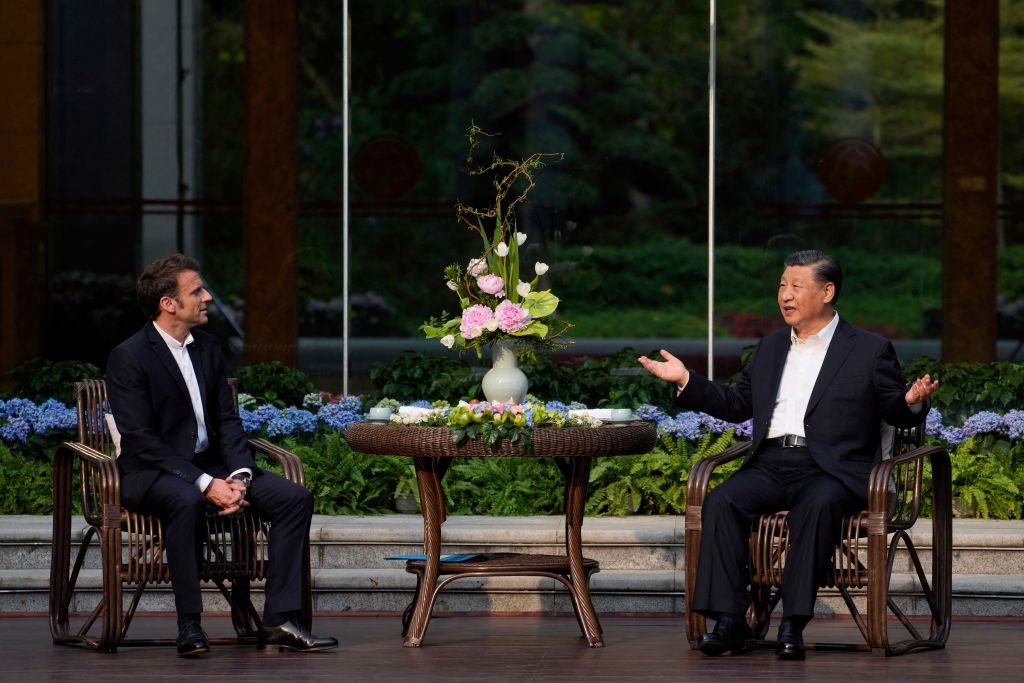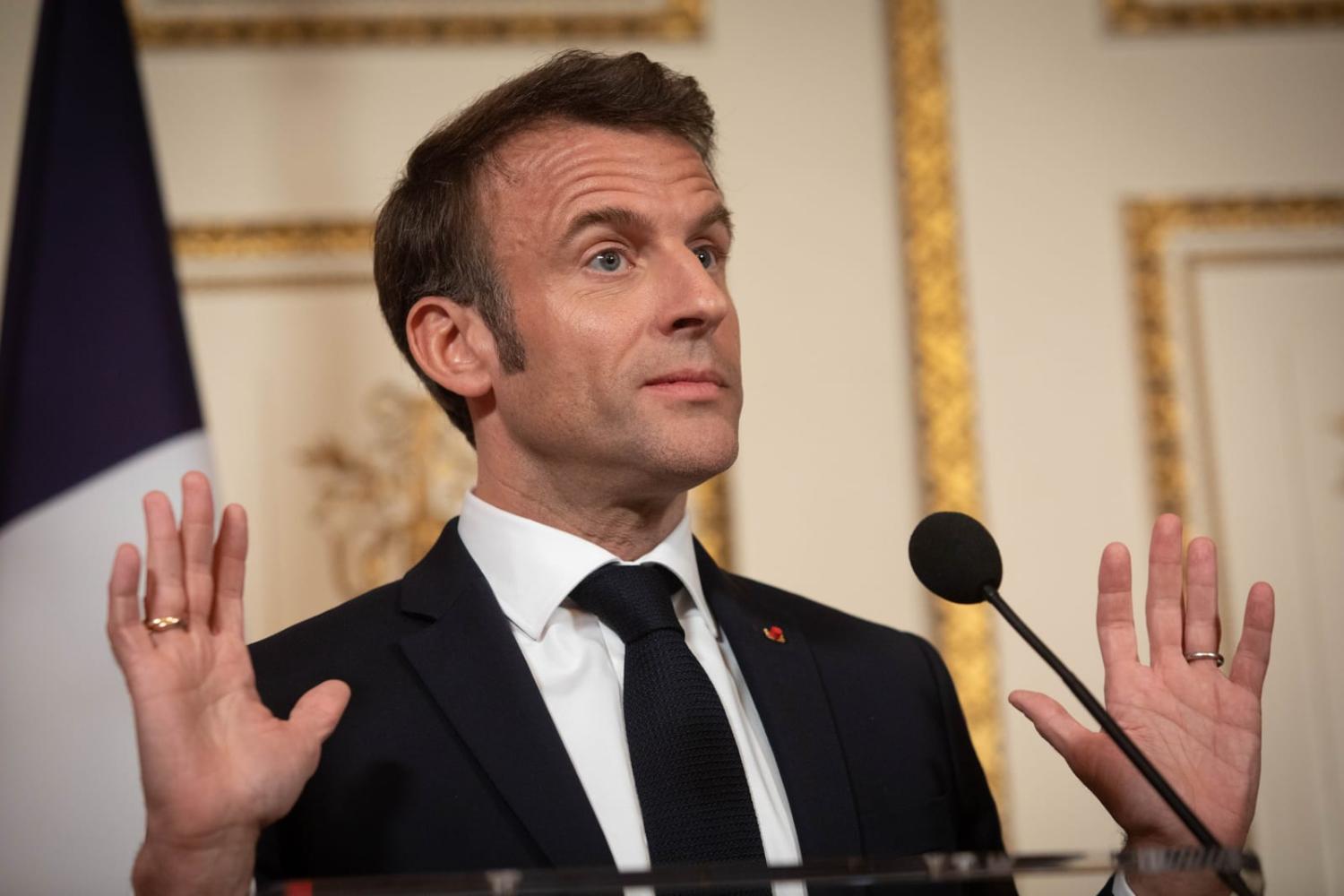Returning from a trip to Beijing, President Emmanuel Macron gave an interview this week to journalists from Politico and French newspaper Les Echos. His words, especially when asked about Taiwan, have stirred a great deal of controversy, some justified, but some not.
Macron’s trip to China was certainly a PR disaster. Photos alongside President Xi Jinping portrayed Macron as obsequious rather than diplomatic, not the sort of figure expected to be advocating for a strong European role in Asia.
His staff also mistakenly sought maximum control in dealing with the press, insisting they be allowed to vet all the President’s quotes as a condition of his granting the interview. Likely, Macron was hoping to come away with this trip with a win to deflect from his troubles at home, and willing to do a lot to achieve one.
China also did Macron no favours, given that in the days after he departed, Beijing conducted military drills around Taiwan, simulating a blockade of the island as well as precision strikes.
However, reading some commentary reacting to Macron’s statements, you’d think that he had decided that the PLA should jump over the Taiwan Strait tomorrow.

The most-reported snippets of Macron’s interview are his statements that Europe should not “take our cue from the US agenda and a Chinese overreaction”, and that Europe risks become one of “America’s followers”. Translation is a fickle thing, and this rendering of French into English can reasonably be disputed.
In this case it is best to refer to the full interview, published in Les Echos, rather than the quotes used in the Politico piece. This is not to say, as some have suggested, that Politico was intending to distort Macron’s words. This is not a case of “what did the President actually say?” Reading his interview in its entirety simply provides more context.
The context being that these remarks represent nothing more or less than a continuation of the policy approach that Macron laid out months after becoming President at a speech to the Sorbonne in September 2017.
Here is a quote from that earlier speech:
It is by constantly articulating the driving ambition of a few and respecting everyone’s pace that we will create the desire to move forward, and that Europe will progress for the benefit of all.
Now take the full quote of Macron’s statement about Taiwan from the recent interview:
Do we have an interest in an acceleration over the subject of Taiwan? No. The worst choice would be to think that we, Europeans, must be followers on this subject, and adapt ourselves to an American pace and a Chinese overreaction. Why should we go at the rhythm chosen by others?
Speaking in the Netherlands, Macron has since reiterated this view, while also stating in clear terms that both France and Europe supports the status quo situation with regard to Taiwan.
Not only is Macron displaying continuity over a nearly six-year period, but his seems a reasonable point. Reflecting on the conversations that have been had recently in Australia about sovereign decision-making, why should we begrudge a country for wanting to contribute in its own way to the prevention of a major crisis in the Indo-Pacific?
Macron certainly expressed himself in a colourful and typically Francophone way – other than Scott Morrison’s brief dalliance with International Relations theory, you’d be hard-pressed to remember an Australian PM talking about events in international affairs “from a Gramscian perspective”. But the reaction to Macron’s comments has also been typically – and disappointingly – Anglophone.
The French President’s statements are not some kind of Munich-lite appeasement speech, as former UK prime minister Liz Truss suggests. Nor can any one leader can speak for all members of the European Union. Macron’s comments were an expression of existing French policy.
The idea of a trading bloc the size of the European Union acting to balance against the potential aggression of a rising China should be greeted with interest and engagement. Unlike Australia, which until recently believed it could reasonably not make a choice between the United States and China, the EU’s economic heft make it far more able to do just this.
Macron’s government understands that a crisis in Asia would affect Europe. The French Indo-Pacific Strategy, unveiled by Macron at Sydney’s Garden Island in 2018, and updated in 2022, makes this point in its first pages. And the French military presence of more than 8,000 soldiers stationed in the Indo-Pacific, from Réunion to French Polynesia, is, of course, far higher a number than partners in London appear capable of providing.
Undoubtedly, world leaders should be careful about what they say, when, and how they say it. Yet as Foreign Minister Penny Wong has said, talking to China is good. Asserting that a war over Taiwan is in no one’s interest is correct. Deterrence can be an effective way of preventing war, but major arms races between superpowers have rarely ended peacefully.
Recent Australian governments of both persuasions have talked about welcoming like-minded engagement in the region. After reading the commentary of the last few days, you have to wonder if that only means minds that think in English.

